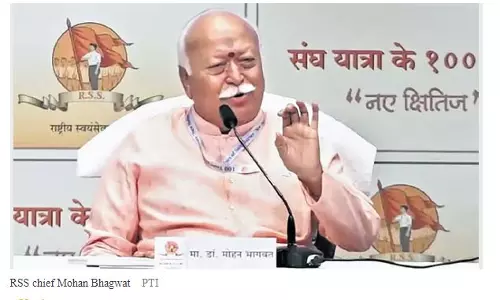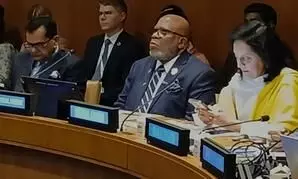
India made digital revolution accessible to millions: UNGA President
text_fieldsUnited Nations: UN General Assembly President Dennis Francis said that India has become the example for how digital revolution can be made accessible to millions and be"a fundamental driver of social transformation and progress".
"Models like the Citizen Stack (of India) should be embraced and replicated across countries in the Global South – supporting and empowering people, particularly the most vulnerable in our communities, in the true spirit of leaving no one behind," he said on Thursday.
Speaking at a conference on Digital Public Infrastructure (DPI) hosted by India's UN mission, he recalled his visit to India in January, when, he said, he saw the rapid expansion of digital public infrastructure that has removed many barriers and "enabled millions to achieve financial independence and prosperity".
"In just seven years, India's digital public infrastructure model has achieved over 80 per cent financial inclusion for its citizens, and now accounts for more than 60 per cent of all digital transactions worldwide," he said.
At the conference, India showcased its Citizen Stack, the pioneering DPI, that provides seamless interoperability between various functions, from identity (for example, Aadhar) and payments (like UPI and Walmart's PhonePe) to health (Sanjeevani) and public services delivery.
India's Electronics Minister Ashwini Vaishnaw in a video message said, "India believes in the ethos of 'One World, One Family, One Future' (and) consistent with our ethos, we offer our Citizen Stack to the world."
"The G20 summit in New Delhi last year recognised the transformative power of DPI and following this, India took the initiative to establish a global repository for DPIs currently housing over 55 DPIs from 16 countries," he said.
"India has pledged $200 million to a social impact fund that will accelerate DPI adoption globally, especially in the developing countries," he added.
In the digital universe, India's DPI is unique because unlike the commerce-driven systems predominating the West or the closed government-controlled model in China, India's DPI provides an open digital infrastructure with guardrails that the private and public sectors can use.
India's Permanent Representative Ruchira Kamboj said, "India's journey offers powerful lessons for other nations embarking on digital transformations emphasising a design approach focused on shared building blocks to spur innovation across ecosystems."
"We invite you to engage with us, let's stack up the benefits worldwide, and help millions more," she said, "achieve their dreams".
To evangelise the DPI model, India's UN Mission is holding one-on-one sessions on Friday for countries that are interested in adopting it.
Amitabh Kant, who was India's Sherpa for the G20 Summit, said that India was offering a "modular open source identity platform" that can be adopted by any country's needs.
"Do not replicate what India has done," he said. "If you want to transform the lives of citizens like India, you can use the model based on your own country's ethos in a manner so that you can transform the lives of your citizens."
IANS with edits






















